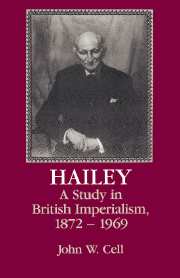Book contents
- Frontmatter
- Contents
- List of abbreviations
- Glossary of foreign words
- Preface
- 1 Early life
- 2 Colonization officer, 1901–1906
- 3 From Sargodha to Delhi, 1907–1912
- 4 Chief commissioner of Delhi, 1912–1918
- 5 A report on the Punjab
- 6 Finance member, 1919–1922
- 7 Home member, 1922–1924
- 8 Governor of the Punjab: the Sikhs, 1924–1925
- 9 Governor of the Punjab: the communal problem, 1924–1926
- 10 Governor of the Punjab: the communal problem, 1927–1928
- 11 Governor of the United Provinces, 1928–1930
- 12 Governor of the United Provinces: civil disobedience and Round Table Conference, 1930–1931
- 13 Governor of the United Provinces: 1931, year of crisis
- 14 Governor of the United Provinces: winding down, 1932–1934
- 15 Surveyor of Africa, 1935–1939
- 16 Two missions to Africa, 1939–1940
- 17 A report and a vision, 1941–1942
- 18 Adviser and propagandist, 1942–1945
- 19 Indian partition and the onset of African decolonization, 1945–1949
- 20 Defender of the faith, 1949–1969
- Bibliography
- Index
3 - From Sargodha to Delhi, 1907–1912
Published online by Cambridge University Press: 12 October 2009
- Frontmatter
- Contents
- List of abbreviations
- Glossary of foreign words
- Preface
- 1 Early life
- 2 Colonization officer, 1901–1906
- 3 From Sargodha to Delhi, 1907–1912
- 4 Chief commissioner of Delhi, 1912–1918
- 5 A report on the Punjab
- 6 Finance member, 1919–1922
- 7 Home member, 1922–1924
- 8 Governor of the Punjab: the Sikhs, 1924–1925
- 9 Governor of the Punjab: the communal problem, 1924–1926
- 10 Governor of the Punjab: the communal problem, 1927–1928
- 11 Governor of the United Provinces, 1928–1930
- 12 Governor of the United Provinces: civil disobedience and Round Table Conference, 1930–1931
- 13 Governor of the United Provinces: 1931, year of crisis
- 14 Governor of the United Provinces: winding down, 1932–1934
- 15 Surveyor of Africa, 1935–1939
- 16 Two missions to Africa, 1939–1940
- 17 A report and a vision, 1941–1942
- 18 Adviser and propagandist, 1942–1945
- 19 Indian partition and the onset of African decolonization, 1945–1949
- 20 Defender of the faith, 1949–1969
- Bibliography
- Index
Summary
After leaving his canal colony Hailey became chief secretary to the Punjab government. The following summer he joined the Government of India's finance department, and in 1911 he was appointed to a committee to prepare for the Delhi Durbar during the coronation visit of the king-emperor George V. Although enteric (typhoid) fever forced him to miss the ceremony, the durbar assignment brought him into close contact with the viceroy, Lord Hardinge, who was sufficiently impressed to make him the first chief commissioner of the new Delhi capital enclave. Delhi put him in line for further assignments in the central government – finance member and then home member of the Viceroy's Council – and finally for the job he wanted most, the governorship of the Punjab.
Even though he was being promoted, with a good increase in salary, Hailey must have left Sargodha with mixed feelings. On the Jhelum he had been a petty despot with direct authority over thousands of people. In Lahore or Calcutta he would be just another paper-pushing bureaucrat. The biographer must also regret the move, the effect of which is to reduce the amount of available evidence very severely. Whereas the colonization officer submitted his own reports, the chief secretary of the Punjab or deputy secretary in the finance department wrote only notes. And these, on the apparent assumption that the internal working of administrative offices could be of no conceivable interest, the indefatigable record-weeders at the National Archives of India have destroyed almost entirely.
- Type
- Chapter
- Information
- HaileyA Study in British Imperialism, 1872–1969, pp. 32 - 41Publisher: Cambridge University PressPrint publication year: 1992



